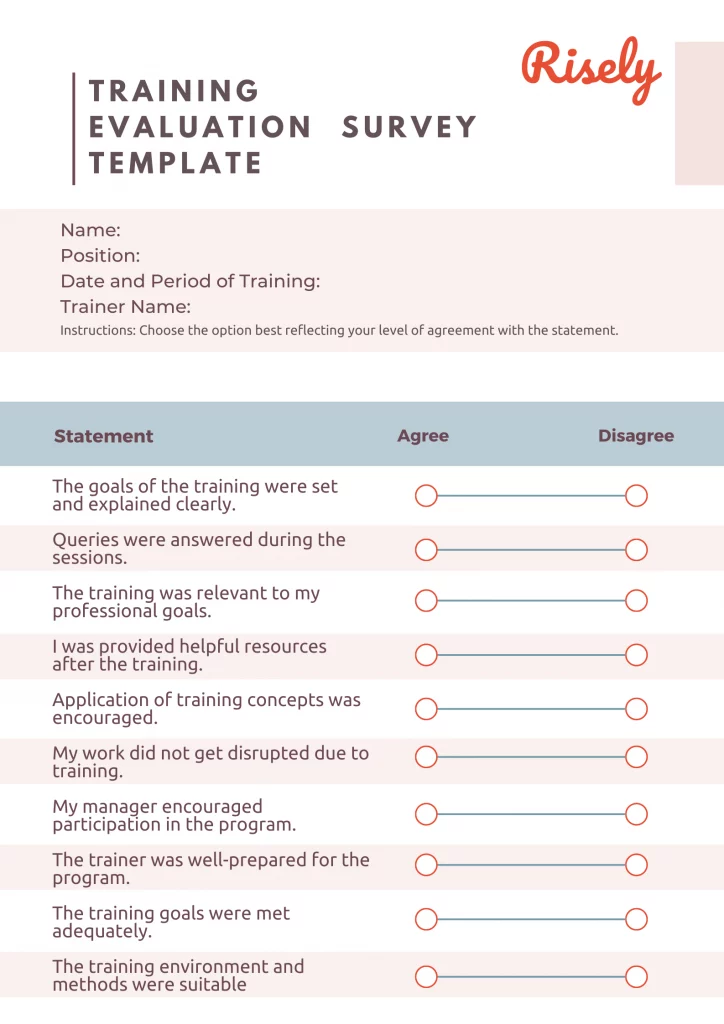The Complete Guide to Training Evaluation Survey (With 20+ Questions)
Training evaluation surveys are an essential tool for organizations to assess the effectiveness of their training programs. By conducting these surveys, you gain valuable insights into how learners perceive the training, what they learned, and how it can be improved. This blog post will deeply dive into everything you need to know about training evaluation surveys. Starting from understanding why you should conduct them first, we will explore the three stages of a training evaluation survey and the types of questions that can be included at each location. We will also provide templates with sample questions for creating your survey and best practices for designing effective surveys. Lastly, we will discuss how to analyze and use your survey results to improve your training program continuously. So let’s get started on creating a more effective and impactful training program together!Why Conduct Training Evaluation Surveys?
Conducting training evaluation surveys can gauge the effectiveness of training programs, obtain participant feedback, and pinpoint areas for improvement. It also justifies investment in employee development and guides future training initiatives. Training evaluation surveys are conducted for several reasons.- Firstly, they help to gauge the effectiveness of the training program and determine whether it has met its objectives. This information can be used to make improvements or changes to future training sessions.
- Secondly, these surveys allow participants to provide feedback on their experience, including what worked well and what could be improved. This feedback can be used to enhance the training program for future participants.
- Thirdly, the results of these surveys can be used to demonstrate the effectiveness of the training program to stakeholders such as management or clients.
Other Interesting Reads
Types of Training Evaluation Survey Questions
Training evaluation surveys are crucial for measuring the effectiveness of a training program. These surveys should include different question types such as reaction, learning, behavior, and results questions. Gathering feedback through open-ended and closed-ended questions ensures both quantitative and qualitative data are collected. It is essential to ensure anonymity and confidentiality to encourage honest feedback. Incorporating these tips can help improve the quality of future training sessions.Pre-Training Survey Questions for Learners
Before starting any training program, it’s crucial to understand the learner’s needs and preferences. Designing a comprehensive Pre-training survey helps evaluate the learner’s knowledge level and expectations. Include questions about previous training experiences, preferred learning styles, and specific areas of interest or need. Also, ask about logistical concerns such as scheduling and technology requirements. Obtaining valuable feedback through these surveys can help tailor future training programs to improve overall learner satisfaction. Some questions that can be asked in pre-training surveys are:- What are your main objectives or expectations for this training program?
- How would you rate your current level of knowledge/skill in the subject matter?
- What specific topics or areas would you like the training to cover?
- What challenges or obstacles do you anticipate in applying the knowledge/skills from this training in your work?
- What previous training or experience do you have related to the subject matter?
- How do you prefer to learn and acquire new knowledge/skills (e.g., hands-on practice, group discussions, reading materials)?
- What specific goals would you like to achieve as a result of attending this training?
- Are there any particular aspects or concepts of the subject matter that you find confusing or would like clarification on?
- How do you envision applying the knowledge/skills gained from this training in your job role?
- Do you have any specific questions or concerns regarding the logistics or format of the training program?
During-Training Survey Questions for Learners
Gathering feedback from learners through during-training survey questions is a crucial aspect of any effective training program. These surveys help trainers identify areas that need improvement and adjust the training program accordingly. Through this type of survey, trainers can ask about various aspects, such as course material accessibility and learning objectives, with open-ended or Likert scale questions for valuable feedback. By doing so, future training modules can be made more engaging and effective by ensuring that employees receive high-quality training experiences. Some questions that can be asked this stage are:- How would you relate the concepts covered in this training to your current work or job role?
- What specific examples or real-life scenarios can you think of where the training concepts can be applied?
- Can you share any challenges or difficulties you foresee in implementing the knowledge/skills learned in this training?
- Are there any areas or topics within the training that you would like further clarification or explanation on?
- How do you think the training content aligns with the goals and objectives you set during the pre-training evaluation?
- Can you provide an example of how you have successfully applied a concept from the training in your work or personal life?
- What are some potential barriers or obstacles you might encounter while applying the training knowledge/skills, and how would you overcome them?
- How confident do you feel in your ability to transfer the knowledge/skills learned in this training to your job responsibilities?
- Can you share any specific strategies or action plans you have developed based on the training content?
- What additional support or resources do you think would be helpful in reinforcing the training concepts and promoting successful implementation?
Post-Training Survey Questions for Learners
Collecting valuable feedback from learners after a training program is essential for assessing its effectiveness. Post-training evaluation surveys are an effective tool for gathering this feedback as they can help trainers identify areas needing improvement in course content, delivery method, accessibility, etc. These surveys usually consist of open-ended or Likert scale questions that are easy to understand and answer. A few examples of such questions are:- What were the most valuable or beneficial aspects of the training for you?
- How do you plan to apply the knowledge/skills you gained from the training in your work or job role?
- Can you share any specific examples or instances where you have already started implementing the training concepts?
- Did the training meet your expectations and address your learning objectives? If yes, how? If not, what could have been improved?
- What challenges or obstacles do you anticipate in applying the training knowledge/skills, and how do you plan to overcome them?
- How has the training influenced your understanding or perspective on the subject matter?
- Have you noticed any positive changes or improvements in your work performance or productivity as a result of the training? If yes, please elaborate.
- Is there any additional support or resources you would like to receive to further reinforce the training content?
- What suggestions or feedback do you have for improving future training programs on similar topics?
- Would you recommend this training to others? If so, why?
Best Practices for Creating Training Evaluation Surveys
Some best practices of training evaluation surveys include:- Clearly defining the objectives and goals of the training program.
- Creating survey questions that are specific, measurable, and relevant to the training program.
- Use a mix of open-ended and closed-ended questions to get valuable feedback from a training evaluation survey. Close-ended questions provide quantitative data, while open-ended ones give detailed feedback.
- Ensuring anonymity and confidentiality of respondents to encourage honest feedback.
- Timing the survey appropriately, such as immediately after the training or a few weeks later to allow time for application of learning.
- Analyzing and interpreting survey results to identify areas of improvement for future training programs.
- Sharing survey results with key stakeholders, such as trainers and management teams, to inform decision-making and improve future training initiatives with better ROI from L&D in mind.
- Customize your study by asking participants about the course material they found helpful or challenging and if the training met their expectations.
- Ensure you include questions on trainers’ communication skills and engaging abilities with learners.
Template for Creating a Training Evaluation Survey

How to Analyze and Use Training Evaluation Survey Results?
To analyze and use training evaluation survey results, start by reviewing the responses to identify any patterns or trends that emerge. Look for areas where participants struggled or excelled, and consider how these findings can be used to improve future training sessions. It may also be helpful to compare the results of different training methods or programs to identify best practices and areas for improvement. Once you have analyzed the survey results, use them to make specific changes to your learning and development strategy. This might involve modifying the content or delivery of the training, revising the training materials, or addressing specific areas of concern that were identified in the survey feedback. It is important to communicate the survey results and any changes made based on those results with your team members or stakeholders. This helps to build trust and engagement in the training process, and ensures that everyone is aligned on how to improve future training sessions. By using training evaluation survey data effectively, managers can continuously improve your training program and ensure that it meets the needs of your learners.Conclusion
Training evaluation surveys are essential for understanding the effectiveness of your training programs. With the right questions, you can get valuable feedback from learners, trainers, and managers to continuously improve and fine-tune your training approach. By conducting these surveys, you can identify gaps in knowledge or skills and take corrective action to address them. Our guide provides templates and examples of survey questions to use as a starting point for creating your evaluation surveys. We also share best practices for designing effective surveys and analyzing the results.Simplify training evaluation surveys with free resources from Risely!
Grab your free copy equipped with the right training evaluation survey questions to support you.
Training Evaluation Survey FAQs
What is training evaluation survey?
A training evaluation survey is a feedback tool used to assess the effectiveness and impact of a training program. It gathers participants’ opinions, perceptions, and feedback on various aspects of the training, such as content, delivery, and application
What are the 5 steps of training evaluation?
The five steps of training evaluation are: 1) Define evaluation objectives, 2) Design evaluation measures and tools, 3) Collect data, 4) Analyze data, and 5) Report findings and make improvements.
How do you evaluate training?
Training can be evaluated through methods like surveys, assessments, observations, and interviews. It involves assessing learning outcomes, participant satisfaction, knowledge retention, behavior change, and the overall impact of the training on individual and organizational performance.
What is the purpose of a training survey?
The purpose of a training survey is to gather feedback and insights from participants about their learning experience, identify areas of strength and improvement, and inform future training program design and delivery. It helps organizations assess the effectiveness of training initiatives and make data-driven decisions to enhance learning outcomes.
Other Related Blogs
How to Create a Course with AI: A Guide for L&D Professionals
How to Create a Course with AI: A Guide for L&D Professionals According to a McKinsey survey(1), only 11% of business leaders believe their leadership development initiatives yield meaningful results.…
How to build a Learning and Development Action Plan ft Katie Greenwood
How to build a Learning and Development Action Plan? ft Katie Greenwood Does your company’s Learning and Development (L&D) strategy feel like more “guessing” than “winning”? You’re not the only…
Generative AI for Learning and Development: Getting Started
Generative AI for Learning and Development: Getting Started In 2024, organizations spent $401 billion globally on corporate training(1), yet 70% of employees report feeling unprepared for the future of work…
Future proofing a learning strategy for organizations with Inna Horvath
Future Proofing a Learning Strategy for Organizations with Inna Horvath With the advent of AI, everyone’s anticipating changes. L&D leaders in charge of building a learning strategy for organizations are…


